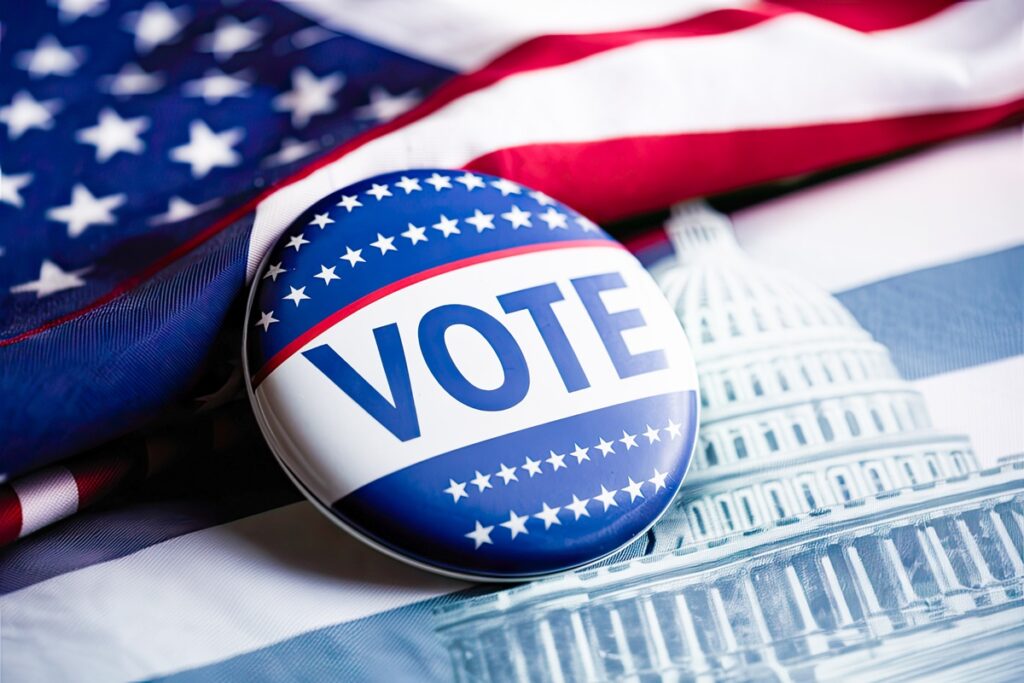This piece originally appeared in the July 2024 edition of MortgagePoint magazine, online now.
Political cartoonist and “Father of the American Cartoon” Thomas Nast, while not necessarily a household name, is renowned for illustrating a number of famous and iconic drawings. From modern images of Santa Claus and Uncle Sam, Nast also popularized the donkey to represent the Democratic party and the elephant for the Republican party.
As we near November and Election Day, that animal representing a political party may not be the only elephant in the room as the ongoing issues surrounding the housing market linger near the top of many Americans’ minds. All candidates, no matter what party they lead, will be tasked with providing solutions to address the record-high median prices and mortgage rates that continue to shut out many from achieving the American Dream.
To get a preview of what November may hold for the housing industry, MortgagePoint reached out to a cross-section of industry experts to get their insights on how the housing market and mortgage industry may be affected by this year’s election, and how companies should be preparing.
 Pete Carroll serves as SVP, Public Policy and Industry Relations for CoreLogic, where he oversees industry and public-sector engagement programs, drives enterprise strategic initiatives, and expands opportunities for the company’s thought leadership, insights, brand awareness, and solutions expertise within Washington, D.C., across federal housing agencies and other stakeholders.
Pete Carroll serves as SVP, Public Policy and Industry Relations for CoreLogic, where he oversees industry and public-sector engagement programs, drives enterprise strategic initiatives, and expands opportunities for the company’s thought leadership, insights, brand awareness, and solutions expertise within Washington, D.C., across federal housing agencies and other stakeholders.
 Jacob Channel, Senior Economist for LendingTree, conducts studies on a wide variety of subjects related to the nation’s housing market, and provides general macroeconomic analysis. Channel joined LendingTree in 2018 as an intern before moving into his current position. His work has been featured in major publications including the New York Times, Bloomberg, Forbes, and CNBC, and he has appeared as a guest on Cheddar TV and Yahoo! Finance.
Jacob Channel, Senior Economist for LendingTree, conducts studies on a wide variety of subjects related to the nation’s housing market, and provides general macroeconomic analysis. Channel joined LendingTree in 2018 as an intern before moving into his current position. His work has been featured in major publications including the New York Times, Bloomberg, Forbes, and CNBC, and he has appeared as a guest on Cheddar TV and Yahoo! Finance.
 Larry Goldstone, President, Capital Markets and Lending, BSI Financial Services, is responsible for the structuring and growth of BSI’s excess spread mortgage servicing rights (MSRs) initiatives. He works with institutional investors and other capital partners that are looking to invest in MSRs. Goldstone helps with structuring transactions acceptable to the agencies, acquiring MSRs in bulk and flow channels, providing leverage financing options, and setting up advanced financing facilities. He is also responsible for BSI’s Home Lending Division and Ancillary Services businesses, which include a title company, an REO disposition company, a foreclosure trustee, and a quality control review business. Prior to BSI, Goldstone was Founder and CEO of Thornburg Mortgage, a NYSE-listed mortgage REIT focused on agency and private-label RMBS portfolio investing and high-quality jumbo lending and securitization.
Larry Goldstone, President, Capital Markets and Lending, BSI Financial Services, is responsible for the structuring and growth of BSI’s excess spread mortgage servicing rights (MSRs) initiatives. He works with institutional investors and other capital partners that are looking to invest in MSRs. Goldstone helps with structuring transactions acceptable to the agencies, acquiring MSRs in bulk and flow channels, providing leverage financing options, and setting up advanced financing facilities. He is also responsible for BSI’s Home Lending Division and Ancillary Services businesses, which include a title company, an REO disposition company, a foreclosure trustee, and a quality control review business. Prior to BSI, Goldstone was Founder and CEO of Thornburg Mortgage, a NYSE-listed mortgage REIT focused on agency and private-label RMBS portfolio investing and high-quality jumbo lending and securitization.
 Rick Sharga serves as President & CEO of CJ Patrick Company, a market intelligence firm geared towards real estate and mortgage companies. As one of the country’s most frequently quoted sources on real estate, mortgage, and foreclosure trends, Sharga has appeared on CNBC, CBS News, NBC News, CNN, ABC News, FOX, and Bloomberg. He is a founding member of the National Mortgage Servicing Association (NMSA) and sits on the Board of the National Association of Default Professionals. He has more than 20 years of experience in the industry, including roles as EVP at ATTOM Data, Carrington Mortgage Holdings, RealtyTrac, and Chief Marketing Officer at Auction.com.
Rick Sharga serves as President & CEO of CJ Patrick Company, a market intelligence firm geared towards real estate and mortgage companies. As one of the country’s most frequently quoted sources on real estate, mortgage, and foreclosure trends, Sharga has appeared on CNBC, CBS News, NBC News, CNN, ABC News, FOX, and Bloomberg. He is a founding member of the National Mortgage Servicing Association (NMSA) and sits on the Board of the National Association of Default Professionals. He has more than 20 years of experience in the industry, including roles as EVP at ATTOM Data, Carrington Mortgage Holdings, RealtyTrac, and Chief Marketing Officer at Auction.com.

Q: What do you anticipate will be the primary impact on mortgage and housing if President Biden wins re-election in November? How do you anticipate the housing and mortgage markets may evolve over the next four years of that administration?
Pete Carroll: The primary impact on housing and mortgage under President Biden will be the status quo of focusing on the broader narratives of so-called “junk fees” and perceived “anticompetitive behaviors.”
We will see a continued focus on increasing affordability and equity in housing, as well as continued scrutiny of so-called “junk fees” in rental housing and increases in certain mortgage closing costs. As part of addressing the expiration of the Tax Cuts and Jobs Act, President Biden might use that opportunity to persuade Congress to include tax credits to stimulate new housing supply and subsidies to provide down payment and rental assistance to first-time homebuyers and lower income families. Maintaining the increased annual rate of immigration may provide a tailwind for construction labor critical to stimulating new housing supply.
We also expect to see continued focus on climate-related financial risks to homes, including how these risks are contributing to the disruption of homeowners’ insurance availability, and the costs and benefits of investing in municipal infrastructure and home adaptations to make for more resilient communities.
Jacob Channel: President Biden has laid out a robust set of policy goals related to housing. For example, the Biden administration outlined several proposals including a mortgage relief tax credit designed to make homebuying more affordable to middle-class first-time buyers, a call on Congress to expand down payment assistance for first-generation homeowners, FHFA rule changes to reduce mortgage closing costs, tax credits and other incentives to help build and preserve more affordable housing units, and tighter regulation of the rental industry to help keep costs lower for renters.
Thus far, many of these proposals have not come to fruition, owing in large part to inaction from Congress. But changes like reduced mortgage insurance (MI) premiums for FHA mortgages have gone into effect. If Biden wins another term, I imagine that we will see his Administration continue to push these proposals, and we may even see more Congress-bypassing executive action that, among other things, aims to compel federal agencies to reduce fees on government-backed mortgages.
That said, I do not anticipate that we will see a major overhaul of the broader mortgage industry or massive changes to the housing market over the next four years should Biden win. That would require Congressional action that doesn’t seem likely barring some unforeseen sweep by Democrats in both chambers of Congress and the presidency in November.
With that in mind, another Biden term may force the broader mortgage industry to adopt some changes and deal with more regulation, but, again, things probably are not going to change too dramatically.
Unfortunately, this means that even if the market becomes a bit more affordable, many will struggle with housing costs in another Biden term.
Larry Goldstone: There are various aspects to this question.
First, I suspect that not much will change if President Biden is re-elected when it comes to interest-rate policy and the Fed. Biden is taking a hands-off approach and is not influencing the Fed and their interest-rate policies. There are certainly risks here, but the risks are double-edged. If the Fed is too tight, we will likely end up in a recession. If the Fed is too easy, we will have continued above-target inflation. Exactly right is hard to achieve.
Second, I think that the current administration has worked extremely hard to make foreclosure almost impossible. Most of the defaulted mortgages are in the Ginnie Mae portfolio. Ginnie Mae has continued to grow its portfolio, which also means its risk. I worry about those policies and the moral hazard created by those actions. Not everyone can afford to be a homeowner, and using taxpayers to backstop those that cannot afford to own a home is a problem.
Third, I do not expect that Biden will address the issue of what to do with Fannie Mae and Freddie Mac … they seem to like the status quo. It serves both a public policy and social policy agenda for Dems, so I doubt they are motivated to resolve the conservatorship any time too soon.
Rick Sharga: The housing and mortgage markets are struggling to recover from Fed policy whiplash: several years of zero-interest-rate policies leading to historically low mortgage rates and soaring home prices followed by historically unprecedented hikes in the Fed Funds Rate, which doubled mortgage rates in a few months, decimating affordability and creating massive “rate lock” among millions of homeowners.
The most likely scenario—no matter which party occupies the White House in 2025—is that it will take several years to work through these issues … several years of sluggish home sales, gradually declining mortgage rates, and slowly improving affordability resetting the market into a “new normal.”
That said, there are some fundamental differences in approach between President Biden’s administration and former President Trump’s.
The Biden administration has focused primarily on programs and policies intended to improve affordability—both for homebuyers and renters. These programs have typically featured subsidies to renters and tax incentives to first-time homebuyers or homebuyers from underserved populations.
While well-intentioned, the latter are more likely to exacerbate affordability issues than improve them. The fundamental problem in today’s housing market is lack of supply—especially entry-level homes—partly because builders have under-built for the past decade and over 60% of current homeowners are locked into their homes with sub-4% mortgage rates and simply cannot afford to sell their home and buy another.
The type of tax incentive programs the Biden administration is proposing are intended to make it more affordable for buyers to purchase a home, but these types of programs tend to bring more buyers to market, increasing demand against an already-insufficient supply, which will ultimately cause home prices to rise further, making homes even less affordable.
More recently, the Biden administration has begun discussing ways to increase supply. In fact, it recently released $85 million in funding to 21 state and local governments to have them remove barriers to the construction of affordable housing. This is a step in the right direction but is likely to add only a minimal number of homes to the nation’s inventory, which, unfortunately, will not make a dent in the massive, multimillion-unit shortage of homes across the country. But it at least shows that the administration is recognizing the need to address the supply/demand imbalance and is moving toward doing what it can to address it.

Q: What do you anticipate will be the primary impact on mortgage and housing if Donald Trump returns to office?
Pete Carroll: We expect President Trump’s housing and mortgage policy priorities to be marked by a broader narrative of the continuing erosion of the independence of federal regulatory agencies and encouraging more private capital to re-enter the housing system.
A Trump administration will also need to address the expiration of the Tax Cuts and Jobs Act, which may incorporate supply-side stimulative tax credits, for which there is bipartisan support. We expect leadership changes at key independent regulatory agencies, including the Consumer Financial Protection Bureau (CFPB) and Federal Housing Finance Agency (FHFA). We expect new FHFA leadership to re-frame and de-emphasize the Government-Sponsored Enterprise (GSE) Equitable Housing Plans in favor of a renewed focus on recapitalizing and releasing the GSEs—Fannie Mae and Freddie Mac—from conservatorship. Amendments to the GSE Preferred Stock Purchase Agreement (PSPA) between the Treasury and FHFA would likely limit GSE activities and risk-taking parameters post-conservatorship, encouraging greater private capital participation in mortgage markets. This would include the cancellation of certain pilot programs: for example, Freddie Mac’s pilot program to purchase single-family, closed-end second mortgages.
Jacob Channel: In the past, the Trump administration’s housing policy was somewhat vague and contradictory. On one hand, the COVID-era protections passed while Trump was in office did place limits and freezes on evictions and foreclosures (albeit only temporarily). The Trump administration also tried to attract investors to rundown neighborhoods by creating so-called “Opportunity Zones.”
On the other hand, budget proposals from the Trump administration called for cuts to government-funded housing aid programs, the Trump administration got rid of an Obama-era rule meant to reduce housing discrimination, and it imposed tariffs on Canadian lumber (something that can make building homes more expensive).
Generally speaking, housing policy does not appear to be a main priority for Donald Trump. Because of that, it is difficult to say what he has planned for the housing market/broader mortgage industry should he win another term. Given his past administration’s actions, common Republican housing proposals, and comments he has made that make it seem like he is not a fan of things like low-income housing, my assumption is that Trump would try to deregulate the mortgage industry and otherwise gut government housing programs should he win in November.
Deregulation and less government involvement may be met with open arms by some within the mortgage industry, though I would argue that wanton deregulation often does more harm than good. For example, the deregulation that led to mortgage standards becoming too lax in the early 2000’s was a major driver behind the Great Recession. While a housing crash does not necessarily seem likely in the next four years regardless of who wins, I would say the likelihood of it would be higher should we see a second Trump term bring with it a lot of deregulation and the end of a number of government aid programs.
Of course, even if Trump does win and attempt to make serious housing-related changes, he will likely run into the same issues stemming from congressional inaction as Biden would. This might mean the broader market remains unchanged, albeit slightly more affordable than it is now.
Larry Goldstone: A return to the White House by Donald Trump gets a lot more interesting based on various statements he has made.
First, I would expect him to begin to push hard to influence the Federal Reserve. In fact, I suspect that if it is a Republican Congress as well, then the independence of the Fed is going to be called into question, if not stripped away. I also expect that he will be seeking to replace [Federal Reserve] Chairman Powell as soon as he can. Mr. Trump wants to pursue a dovish policy regarding rates in hopes of further stimulating growth. In the near term, that could bode well for housing affordability, but it will only exacerbate the housing shortage.
Second, I suspect that FHA and VA programs might be reined in, as they have created a moral hazard opportunity for homeowners. So many homeowners have figured out that they can live in their homes and make no mortgage payments and live that way for years. Mr. Trump might close that loophole.
Third, I think that a Trump administration would like to try to find a way to release the GSEs from conservatorship. Depending on how that is done, I suspect that it will be a windfall for the wealthy, who buy and large are still shareholders of the GSEs. I am not sure I agree with that outcome, but I do not like the government using the GSEs as a tool to administer some policy objectives related to housing and home price affordability.
Rick Sharga: Based on his first term in office, it seems likely that a second Trump administration would focus on removing some of the regulatory hurdles faced by builders in an attempt to encourage them to build more homes, more quickly, and in more places. It is possible that the administration would attempt an expansion of the QOZ program (Qualified Opportunity Zones program) that was enacted with some success, providing tax incentives for investors and developers to build housing in underserved and economically challenged communities.
Similarly, we could see the administration use a combined carrot-and-stick approach while working with state and local governments to remove barriers erected by NIMBY (Not in My Back Yard) communities to restrict construction of affordable housing.
Politically, it’s almost a certainty that a Trump administration would put as much pressure as possible on Jerome Powell and the Federal Reserve to begin cutting the Fed Funds Rate, which in turn, would likely result in mortgage rates declining, improving affordability for homebuyers and enabling more current homeowners to finally sell their homes, adding to inventory, and probably slowing down the rate of home price appreciation.
There is also a chance that a Trump administration would unwind the conservatorship of Fannie Mae and Freddie Mac, which would allow private capital to re-enter the mortgage market, and could have significant implications for originators, servicers, and participants in the secondary market.

Q: What were some of the stronger policies enacted by the Biden administration that you felt impacted the housing space? Is it still too soon to measure the impact of these policies?
Pete Carroll: While tangible results may take some time to be realized, the Biden administration’s extensive focus on housing affordability and equity have made an impact. Initiatives such as HUD’s Interagency Task Force on Property Appraisal and Valuation Equity (PAVE) have shined a light on and modified industry behaviors with respect to implicit or explicit bias in home appraisals.
The FHFA/GSE Equitable Housing Finance Plans and initiatives by the FHA and Ginnie Mae have significantly increased the availability of mortgage credit for low- to moderate-income (LMI) homebuyers while creating new programs to assist with the rehabilitation of single-family starter homes.
These efforts have also shined a light on the chronic issues of undersupply of all types of housing, sparking numerous state and local initiatives to help address this crisis.
Rick Sharga: Unfortunately, housing policies tend to take a while to be implemented, and a longer time to have a significant impact, so it is hard to say how successful any of President Biden’s initiatives have been or will be eventually.
Much of the focus to-date has been on subsidies to economically disadvantaged households to make renting more affordable, which is good for those tenants but not necessarily the type of program that will have a beneficial long-term impact.
Interestingly, some of the more impactful policies enacted by this administration were extensions of programs created by the Trump administration in the early days of the COVID-19 pandemic. President Biden extended both the foreclosure moratorium on residential properties with government-backed loans, and the CARES Act forbearance program, which helped more than eight million borrowers. His administration also oversaw the execution of the Homeowner Assistance Fund, which distributed $10 billion to the states to be deployed in a manner that would help as many financially distressed homeowners as possible avoid foreclosure. Along with strong loan quality and a strong jobs market, those programs have led to historically low levels of mortgage delinquencies and defaults, which is good for both the mortgage industry and the housing market.
But the bottom line is that—fairly or unfairly—the Biden administration will go down in history as the administration in place when housing affordability was at its lowest point in U.S. history, and that fiscal and monetary policies over the past few years have contributed to home sales declining by 33%, decimating the mortgage industry in the process.

Q: Is there a quick fix or plan that you feel either Presidential candidate can implement that would ease the housing affordability issue and get more first-time buyers into the housing marketplace?
Pete Carroll: There appears to be an emerging consensus view, across both sides of the aisle, that increasing the supply of all types of housing, whether for owner-occupancy or rental is paramount. A new and refreshed slate of federal agency liquidity programs, supply-side tax incentives, and municipal incentives that encourage financial institutions to make capital available for construction or rehabilitation of homes, that incentivize home builders to develop/rehab rental units and single-family starter homes at price points that are affordable to low, moderate, and middle-income families, and that encourage municipal government agencies to ease zoning regulations will be crucial to bringing supply and demand back into balance, moderating the rate of increases for home prices and rental units, and reducing housing cost burden for families.
Larry Goldstone: I think that the housing affordability issue is going to resolve itself over time. To me, home prices reflect a bit of a housing bubble driven by artificially low interest rates during the pandemic. This is one of the unintended consequences, in my opinion. The loan-locked homeowners, the limited inventory of foreclosure home sales, and the high mortgage rates relative to other interest rate benchmarks have all conspired to impact home price availability and affordability. As I think about it—and I suspect I am in a minority of one—there are several dominoes that can fall to burst this home price bubble.
If the Fed is successful in its attempt to reduce inflation, they will also slow the economy, which will drive up unemployment, reduce inflation, and increase mortgage defaults. That environment will result if a reversal of Fed policy from tight policy to easy money as the Fed tries to fight recession. Reduced interest rates generally will reduce mortgage rates, potentially disproportionately. Loan-locked homeowners will be far more inclined to sell in that environment, and I believe that there is a lot of pent-up interest in homeowners wanting to sell. That could bring a lot of supply to the market. As prices start to decrease because the supply side of the equation increases, more panic selling could occur as homeowners seek to monetize the equity they have built up in their homes—thus, the makings of a downward price cycle.
Do either of these Presidential candidates have a policy to implement? I do not think so. I am a believer in market forces.
Rick Sharga: The fundamental issue in the housing market today is that there’s simply not enough inventory to meet the demand—even though demand has weakened as affordability has worsened. And there is really no “quick fix” to creating more supply, at least none that could be easily executed at the Federal level.
Either candidate might consider incentives and penalties for state and local governments that would encourage those entities to relax overly cumbersome restrictions that are currently preventing construction or making it so expensive that building affordable housing is not a realistic option for builders.
As President, either Biden or Trump could explore some sort of public/private partnership that would create strong tax incentives to entice builders to build more affordable, entry-level homes, particularly in underserved communities where the need is greater and the supply extremely limited. Leveraging its massive footprint in the mortgage industry, the government could look for ways to create advantageous financing for homeowners with loans backed by Fannie Mae, Freddie Mac, the FHA, and the VA. And the government could look at restoring some tax benefits to homeowners, which would indirectly improve affordability by lowering tax burdens on households.
In terms of first-time buyers, demographics should provide all the tailwinds that the industry needs. The country has the largest number of young adults between the ages of 25-34 in history—prime ages for household formation—and moving toward the average age of a first-time buyer at 35. According to John Burns Research, approximately 12,000 people in the country are turning 35 every day. First-time buyers account for about one-third of all purchases today, down from a long-term average of 38%. But if/when more affordable inventory comes to market, we may see those numbers increase again, and maybe surpass normal levels.

Q: How should mortgage, mortgage servicing, and other related industries best be preparing for the election’s impact either way?
Pete Carroll: Housing and mortgage policymaking is becoming increasingly politicized, with recent and pending Supreme Court cases weakening federal regulator independence. It is going to be increasingly important for stakeholders across the housing ecosystem to make their voices heard across both sides of the aisle that we need to achieve a more stable equilibrium for regulatory and investor counterparty policies, rather than bearing the costs and distractions associated with the yawing back and forth of housing policies with each political cycle.
Jacob Channel: Regardless of who wins, if the economy continues along its present course, the Fed eventually starts cutting interest rates, and the bond market calms down, then we will likely see more activity in the broader mortgage market as mortgage rates fall. I seriously doubt we will see pandemic-era levels of activity again anytime soon (if ever), but the broader mortgage industry will be a bit busier this time next year than it is now, regardless of who wins.
Because of that, the broader mortgage industry will likely need to prepare for more activity as we enter into 2025, and this may include more hiring.
If Biden wins, the industry may need to deal with more regulations, and some money-makers, like closing costs and insurance fees, may yield less profit than before.
If Trump wins, the industry may experience deregulation. This could drive short-term profits up, but without caution, it may result in risky behavior that ends up causing problems later down the line.
Altogether, with the election still a few months off and the race still too close to call, I do not think the broader mortgage industry can do much to prepare for a second Biden or Trump administration outside of taking common-sense approaches to ensuring that they are properly staffed and that they understand regulations as they are currently written. I wish I could give a more specific piece of commentary or advice, but given how much is still unknown, I cannot.
Larry Goldstone: As a mortgage lender and servicer, we are hoping for less regulation and oversight. We will more likely get that with a Trump administration than a Biden administration. Consumers will fare worse under a Trump administration from a regulatory perspective. But, if I were just a selfish mortgage industry executive, I always hope for less regulation.
Actually, I hope for more intelligent regulation. A Trump administration will reduce regulation in a bad way. A Biden administration will increase regulation. Neither will find intelligent regulation.
Rick Sharga: Regardless of which candidate prevails in November, it is highly likely that the housing market will take a few years to recover. So, purchase loan activity may grow over the next few years, but relatively slowly, and refinance activity even more slowly unless mortgage rates drop more dramatically than most forecasters believe they will.
A second Biden administration is likely to deliver more of the same types of policy and oversight that we have seen for the past few years, possibly with more aggressive regulatory action from agencies like the CFPB. And we are likely to see more requirements for lenders to make financing more available to borrowers in underserved and disadvantaged communities, and for servicers to continue to develop new loss mitigation strategies to help borrowers avoid foreclosure.
Conversely, a second Trump administration could result in less regulatory oversight across the board. But it could also attempt to dramatically limit the government’s role in today’s mortgage market, and even end the conservatorship of Fannie Mae and Freddie Mac, which would undoubtedly create a fair amount of turmoil in originations, servicing, and the secondary market.





